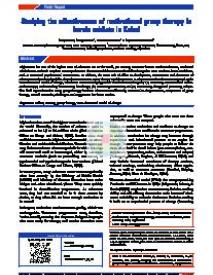Studying the effectiveness of motivational group therapy in heroin addicts in Kabul
Afghanistan has one of the highest rates of substance use in the world, yet existing treatment focuses on detoxification, residential rehabilitation and with very low intensity aftercare. Current available treatment should be changed to more evidence-based modalities, such as structured psychosocial interventions. In addition, the main role of affect in development, maintenance and abstinence of substance use disorders should be also taken into account.
Many therapy models can assist in substance use disorders recovery, such as the trans-theoretical model of change, which is a motivational programme that facilitates change by (1) increasing awareness and self reevaluation; (2) understanding the necessity for change; (3) increasing motivation; and (4) maintaining change and preventing relapse. This field report describes using group therapy for those who are not sufficiently motivated to drug cessation, components of group therapy, as well as results, challenges and suggestions for future studies.
In: Intervention: Journal of Mental Health and Psychosocial Support in Conflict Affected Areas, ISSN 1571-8883 | 16 | 3 | 249-255
http://doi.org/10.4103/INTV.INTV_27_18


